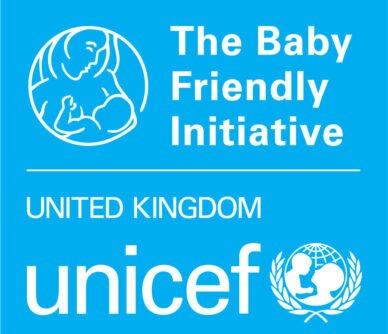The Baby Friendly Initiative is working to transform healthcare for babies, their mothers, parents, primary caregivers and families in the UK.
Introduced to the UK in 1994, the Baby Friendly Initiative has worked with UK public services for 30 years to support families with infant feeding and developing close and loving relationships so that all babies get the best possible start in life.
The Baby Friendly programme operates as part of a wider global partnership between the World Health Organization and UNICEF. In the UK, the programme supports maternity, neonatal, community and hospital-based children’s services to transform their care and with universities to ensure that newly qualified midwives and health visitors have the strong foundation of knowledge needed to support families.
Upholding child rights
The Baby Friendly programme is guided by the United Nations Convention on the Rights of the Child (UNCRC), a legally binding international human rights treaty which outlines the fundamental rights of every child. Under Article 24, states must fulfil obligations to progress children’s right to health, including by means of promoting breastfeeding and by ensuring the provision of accurate health information.
The Committee on the Rights of the Child has recognised the International Code of Marketing of Breastmilk Substitutes (the Code) as an appropriate measure that states are obliged to take to fulfil their obligations under the UNCRC. The Code is an international human rights framework adopted by the World Health Assembly in 1981 which promotes breastfeeding and regulates the inappropriate marketing of breastmilk substitutes so that all families can make informed feeding choices free from commercial influences.
The underlying basis for the Code is the recognition that the health of babies is so important that the usual rules governing market competition and advertising should not apply to products intended for feeding babies.
The accreditation programme
The UNICEF UK Baby Friendly Initiative provides a staged accreditation process aligned with a set of interlinking and evidence-based standards for maternity, neonatal, community and hospital-based children’s services and universities, providing a roadmap for transforming care.
The programme has been recognised and recommended in numerous government and policy documents across all four UK nations, including the National Institute for Health and Care Excellence guidance, resulting in the significant expansion in the number of services that have achieved or are working towards accreditation
Services which implement the Baby Friendly standards receive the prestigious Baby Friendly award, a nationally recognised mark of quality care.
The programme supports services by:
- Setting standards which provide a roadmap for sustainable improvements
- Providing training and personalised support to help services implement the standards
- Assessing progress by measuring the skills and knowledge of health professionals, and interviewing mothers to hear about their personal experiences of care.
Learn more about our evidence-based, staged accreditation process and how it impacts on culture and practice to promote long-term changes in infant feeding care by reading our Theory of Change.
Supporting infant feeding and relationship building
A key intention of the UNICEF UK Baby Friendly Initiative is to raise standards of care for all babies by ensuring that services and staff are equipped to provide families with evidence-based support and information that will enable them to make informed choices about feeding and caring for their baby. This work is based on the extensive evidence of the benefits of breastmilk and breastfeeding for infant and maternal health and is underpinned by the World Health Organization recommendation of exclusive breastfeeding for the first six months of life and up to two years and beyond alongside complementary foods.
In the UK, many mothers stop breastfeeding before they want to. We respond to the particular barriers they face by supporting health professionals to provide sensitive and effective care so that mothers can make an informed choice about feeding, get breastfeeding off to a good start and overcome any challenges.
The Baby Friendly programme also supports families who are bottle feeding by providing guidance and information on safer preparation of infant formula and responsive bottle feeding. In addition, the programme aims to promote close and loving relationships between parents/primary caregivers and babies, recognising how interactions during feeding play a key role in relationship building. Services engaged in the Baby Friendly programme work to ensure that parents/primary caregivers can stay close with their baby and that staff have the knowledge, skills and competence to encourage and support early, secure attachment and responsive, close and loving relationships.
About UNICEF
The United Kingdom Committee for UNICEF (UNICEF UK) is among 32 UNICEF national committees that work locally to promote and protect the UN Convention on the Rights of the Child.
We share a vision to build a better world for every child.
Together, we are committed to:
- Advocating for and creating change for children
- Unlocking resources for programmes for children
- Promoting children’s voices
Our shared ambition is to ensure every child here in the UK and worldwide is healthy, educated, and safe. We work towards this by raising funds for UNICEF’s global work, implementing programmes together with local government to put children’s rights at the heart of local services, and campaigning for child rights to be protected everywhere.



